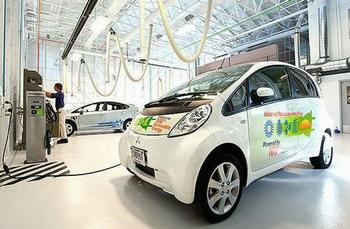
WASHINGTON, DC, March 11, 2013 (ENS) – The U.S. Energy Department Friday announced $50 million in funding for the development of advanced plug-in electric vehicle technologies.
The new funding supports the Energy Department’s EV Everywhere Grand Challenge, which aims to make plug-ins as affordable to own and operate as today’s petrol-powered vehicles within the next 10 years.
“The market for energy-efficient and electric vehicles is expanding dramatically, giving drivers and businesses more options to save money on fuel while reducing carbon pollution,” said Energy Secretary Steven Chu.

The Department will accept applications from industry, national laboratories, and university led-teams.
Funding will go to new research projects that focus on lowering the cost and increasing the efficiency of plug-in electric vehicle components, models and tools to predict vehicles’ performance and help improve fuel economy.
The Department will fund projects across five areas of research and development, including:
Advanced lightweighting and propulsion materials such as cast magnesium alloys, high-strength steel and dissimilar material joining.
Advanced battery development projects to improve cell chemistry, composition, and processing; contribute to battery modeling; or develop advanced electrolytes for next generation lithium-ion cells.
Power electronics to develop lower-cost inverters and capacitors that are capable of withstanding much higher temperatures than current technology and can be commercially manufactured.
Advanced heating, ventilation, and air conditioning systems that can increase all-electric driving range while providing a comfortable temperature for passengers. Projects selected in this area will develop and demonstrate technologies to reduce these auxiliary loads.
Fuels and lubricants that improve the fuel efficiency of light-duty, medium-duty and heavy-duty vehicles.
The U.S. Army is contributing $3.5 million co-funding in several areas where there are joint development opportunities through its Advanced Vehicle Power Technology Alliance with the Department of Energy.
The new funds will be available to projects that help advance the technology goals outlined in the EV Everywhere Grand Challenge Blueprint.
Celebrating its one-year anniversary this month, the Grand Challenge is an Obama administration initiative to expand the availability of workplace charging for American workers – increasing the convenience of plug-in electric vehicles and providing drivers with more options.
Last week, the Department announced 16 new Partner employers have joined the Challenge. They have signed the Workplace Charging Pledge, a commitment to assessing the PEV charging demands of their workforce, then developing and implementing a plan to install workplace charging infrastructure for at least one major worksite location.
More than doubling the original set of partners announced in January, these new partners include: powertrain systems developer AVL, infrastructure software giant Bentley Systems, Biogen Idec, Bloomberg LP, The Coca-Cola Company, the City of Sacramento, Dell, Facebook, The Hartford, The Hertz Corporation, National Grid, New York Power Authority, NRG Energy, OSRAM SYLVANIA, Raytheon Company and Southern California Edison.
The goal of the EV Everywhere Challenge is, by the year 2022, to enable companies in the United States to be the first in the world to produce a five-passenger affordable American electric vehicle with a payback time of less than five years and sufficient range and fast-charging ability to enable average Americans everywhere to meet their daily transportation needs more conveniently and at lower cost.
The Challenge means the U.S. government is working with industry, universities, our national laboratories and government partners to set technical goals for cutting costs for the batteries and electric drivetrain systems, including motors and power electronics, reducing the vehicle weights while maintaining safety, and increasing fast-charge rates.
Copyright Environment News Service (ENS) 2013. All rights reserved.
PHOTO: Scientist reads data from test electric vehicles at the National Renewable Energy Lab’s Vehicle Testing and Integration Facility. (Photo by Dennis Schroeder courtesy NREL)
© 2013, Environment News Service. All rights reserved. Content may be quoted only with proper attribution and a direct link to the original article. Full reproduction is prohibited.
